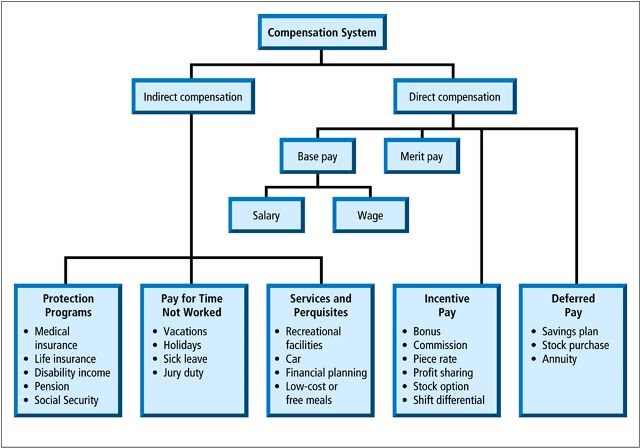Before reading the compensation management topic, one should know the impact of compensation system on the organisation and its gravity if it is not managed effectively. First and last word on compensation management is that, it is core and direct influencing factor on employee motivation and other factors succeeds.
Employees, in exchange of their work, generally expect some appreciation. Money is considered as the most important motivating factor for employees, though non-financial incentives work efficiently. The goals of compensation management are to design the lowest-cost pay structure that will attract, motivate and retain competent employees. Here the term compensation and salary of employee are one and same.
Before knowing about Compensation management one must know the labor laws of the country which are governing employees compensation or remuneration system. International Labour Organisation (ILO) made conventions on labour welfare especially on regularly in payment of wages & salaries with minimum pay for stipulated working hours. In accordance with the conventions & recommendations of ILO every country has established labour laws and enforced, who ever contravene them shall be liable for penalty or punishment under serious cases both may be awarded. Naturally judiciary of the concern country is watchdog for dealing labour issues.
India is one of the countries with very high population and stands second in place followed by china. In the India, parliament has enforced four key laws on wages of workers that are Payment of wages act 1936 and Minimum wages act 1948 for the purpose of ensuring minimum payment for particular type of jobs in different sectors and industries according to stipulated working hours prescribed by the law. Normally eight hours is stipulated working time in almost all countries, above stipulated time if any worker is made to work, his employers has to compulsory pay overtime, if not it shall be treated as unlawful by the court of law for which it may impose penalty. Other side of coin it may create serious dissatisfaction among workers and make them feel that they are being exploited which may lead to agitations eventually may lead strikes which is ultimate weapon in hands of workers, ultimately organisations may chose for lockout which is the weapon in hands of employers altogether may create industrial disputes. On this law may support worker agitation for not complying payment of wages by their employer in accordance with wage laws and in some cases law may support employer if workers agitation causes serious damages to organisation.
The third key law is workmen’s compensation act 1923, the primary objective of this law is to have any compensation by an employee from his employer if any accident occurs, which make permanent are partial disablement. This law defines under schedules various types of accidents certain to happen to worker and percentage of compensation paid to him in accordance with his age.
The fourth key law is Equal Remuneration Act, 1976, according to the section 4 it is the DUTY OF EMPLOYER TO PAY EQUAL REMUNERATION TO MEN AND WOMEN WORKERS FOR SAME WORK OR WORK OF A SIMILAR NATURE. According to Section 3, a settlement arrived at between the management and the employees cannot be a valid ground for effecting discrimination in payment of remuneration between male and female employees performing the same work or work of a similar nature; Mackinnon Mackenzie and Co. v. Audrey D’ Costa, (1987) 2 SCC 469.
“The most important thing is to note that compensation plays a major role in attracting talent from the market and compensation system of the organisation is Key factor for creating employer brand, which is most important factor for attracting talent people. Having talent people for the organisation is a major asset for the organisation development”
Importance of employees compensation or reward system
:-: Compensation or reward system of the organisation is most influencing factor for employee motivation, must remember.
:-: If we observe history of causes of industrial disputes, employee compensation a reward system issues were the main reason in most cases.
:-: good compensation system of rewards system in the organisation will minimise industrial disputes and helps in maintaining peace and harmony within the organisation.
:-: Compensation system plays a key role in employee attrition.
:-: Compensation system mostly influences retention of employee in the organisation.
:-: Most of employee satisfaction depends upon compensation a reward system of organisation.
:-: Effective compensation system builds employer brand, which plays a key role in attracting talent.
:-: Effective compensation system makes employee to put his full efforts for achievement of organisation’s goals and objectives.
:-: Effective compensation system builds initiative towards work, which in turn enhances the productivity of organisation.
:-: Effective compensation makes employees feel belongingness towards the organisation.
The HR Compensation Analyst assists with producing the organization’s compensation program. Their primary responsibility is the research and study to determine appropriate employee compensation. In addition, they evaluate predicted market trends, recommend revisions to company compensation plans, review job descriptions, and assist the Compensation Manager.
The HR Compensation Manager directs the organization’s compensation program. Their responsibilities include developing job descriptions, analyzing jobs, conducting salary surveys and job evaluations, and establishing a salary structure. They suggest revisions to the compensation plan and procedures, administer bonus and incentive programs, and manage the performance appraisal system.


 Follow
Follow